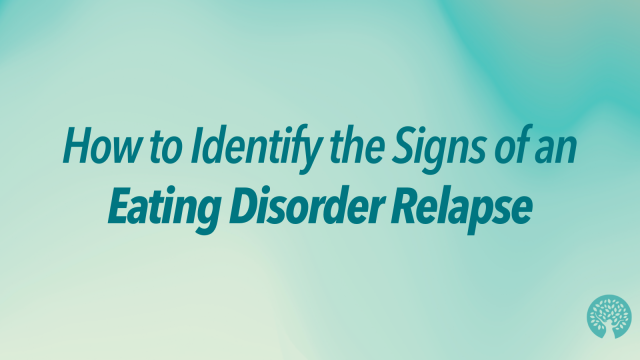Many families are familiar with the ups and downs of eating disorder recovery. A loved one agrees to go to treatment, does the challenging work of therapy and comes out in a better place… but before long, the eating disorder might creep in, little by little, avoiding detection until a relapse is fully underway. This should not be seen as a failure. Instead, it can be seen as the result of a very medically and psychologically complex mental health disorder.
This heart-wrenching situation is particularly concerning because the more momentum an eating disorder picks up, and the longer it goes undetected, the more difficult it can be to confront and treat.
Dealing with an eating disorder relapse
We see many caregivers picking up their loved ones from eating disorder treatment, unprepared for the possibility of a relapse. Their intense hope for complete and lasting recovery outweighs the knowledge that there is a risk for relapse. The caregivers become even more surprised, upset and confused when their loved one relapses. Note: A caregiver is anyone that supports a loved one during treatment (I.e., parents, spouses, partners, grandparents etc.).
When relapse occurs and eating disorder symptoms worsen, there are several consequences: cognitive, emotional, social, financial and physical/medical. An individual’s hope and motivation to recover may lessen; they may even deny that recovery is possible for themselves. For these reasons, it is crucial to know how to help your loved one maintain the gains made in recovery. One important strategy is to know how to prevent or minimize relapse.
Eating disorder relapse rates
Research indicates that more than a third of all patients treated for anorexia nervosa or bulimia nervosa relapse within the first few years of completing treatment. The highest risk for relapse from anorexia occurs in the first 18 months (about 1 and a half years) after treatment, with 35% falling back into eating disordered behaviors.[1]
While the onset of bulimia usually occurs during adolescence or early adulthood, it tends to persist for several years, either chronically or intermittently. Treatment does help most people with bulimia achieve long-lasting recovery, but relapse still is a significant concern, with rates of up to 41% of former patients resuming bulimic behaviors within 2 years.[2]
Eating disorder relapse defined
To understand relapse, we must specifically discuss what relapse is. From the world of addiction treatment comes the helpful concepts of lapse, relapse and collapse.
- In recovery, a “lapse” is common. A lapse may be considered a “slip,” or an isolated incident where an individual engages in a behavior. In these cases, it is important to acknowledge the lapse, understand what contributed to it and learn from the episode to handle the next situation differently. With the right attention, a lapse can be contained quickly. We sometimes tell our patients, “Do the next right thing.”
- A “relapse,” on the other hand, is a longer episode or period of using symptoms in which the individual struggles to get back on track. This may happen during a time of stress or transition and could be met with increasing support and structure for the individual, such as an extra meeting with the dietitian, therapist, or family therapist, or access to supported dinners for a week. It may also result in the need to pursue higher levels of care, depending on the impact.
- Finally, a “collapse” indicates that the individual has not been able to contain the relapse and may need a higher level of care to manage worsened symptoms with more consistent support. Depending on the severity of the incident (is it a lapse, relapse, or collapse?) different interventions are needed. This may include going back to inpatient or residential care.
Who is at risk for a relapse?
Unfortunately, even professionals cannot always predict who is more likely to relapse. Research has shown that among adolescents, the less weight-restored they are when leaving treatment, the more likely they will relapse.[3] Leaving treatment before the body has had an opportunity to stabilize weight means that even slight dips in weight can leave someone in an unhealthy weight range.
Other factors that may make an individual more likely to relapse include:
- Poor body image
- A strong link between body image and self-esteem, or feeling that one’s self-worth is tied to appearance
- Lack of a strong social support network
- Slower response to treatment interventions
- Low motivation to recover during and after treatment
- Intensified eating disorder thoughts and behaviors at time of discharge
- Rapid weight loss upon discharge

Warning signs of eating disorder relapse
It is important to help your loved one maintain the gains made in treatment. This points to the critical importance of caregiver involvement. Emotion-Focused Family Therapy (EFFT) empowers caregivers to better support their loved ones through continued involvement, education and support. EFFT also helps families develop strategies for protecting progress after treatment, such as staying attuned to the following warning signs of relapse.
The warning signs of eating disorder relapse include:
- Skipping meals or snacks or reducing the size of meals or snacks
- Cutting individual food items or groups of foods
- Demonstrating less openness to discussing recovery efforts
- Displaying an attitude of “I’m fine, don’t worry about me”
- Making excuses for not eating
- Exhibiting weight changes
- Eating alone or avoiding mealtimes with others, including not going out to eat
Common eating disorder relapse triggers
Loved ones can remain aware that certain periods during an individual’s life may make them more vulnerable to relapse. Otherwise, life events can trigger stress and anxiety that lead to eating disordered behaviors as a coping mechanism. It is important to pay close attention to how loved ones manage during these times and be ready to support them.
Eating disorder relapse triggers can include transitions such as:
- Starting/ending school or college
- Starting/ending a job
- Starting/ending a relationship
- Moving
- Becoming pregnant
- Having a baby/becoming a parent
- Weight changes associated with physical health, aging or pregnancy
- Physical injury or lessened mobility
- Traumatic events
Can you prevent a relapse?
No matter what your personal situation is or what your loved one is going through, you must acknowledge the risk and prepare for the possibility of relapse. We recommend caregivers help prevent relapse by following the old Boy Scout motto: be prepared. Many eating disorder treatment programs offer weekly relapse prevention groups, and this should be emphasized early in treatment. Learn more at one of our free, online virtual eating disorder support groups here.
When an individual leaves treatment, experts recommend that they have a detailed, personalized relapse plan based upon their own unique circumstances. The plan can include a variety of strategies and can be:
- Created and modified throughout treatment
- Shared with loved ones to provide support and accountability
- Include specific factors that help show if and when the individual is struggling
- List action steps to take if a slip, lapse or full relapse occurs
Encourage your loved one to reach out for support. The more open the entire support system is about how the individual is doing, the better.
Dealing with “slips” or “lapses”
Words matter, especially when it comes to self-talk. Research shows that how someone talks to themselves about a slip can make the difference in maintaining recovery or heading towards a relapse. Below, we share words that your loved one might say, or think to themselves, about slips, lapses or relapse.
Self-talk in recovery: What not to say
After a slip or a lapse, someone might say:
“Well, there I go again. I’ve really blown it. See, I knew I hadn’t changed. I guess all that treatment was for nothing. My parents are going to be really disappointed when they hear about this one.”
We can infer that this kind of negative and self-critical talk could steer someone towards feeling bad about themselves and using disordered behaviors again. While it may seem counter intuitive, we know that shame about a behavior can lead someone to keep using that behavior, rather than preventing the behavior from happening again.
Self-talk in recovery: What to say
Here is an example of self-talk that is more recovery focused.
“I am disappointed that I used a behavior when I felt angry. I wish I had been better prepared for that situation. I do see what I need to do differently next time. Slips are bound to happen in recovery, but overall, I am doing much better than before treatment and that feels hopeful.”
As you can see, this way of talking to oneself is a skill that builds self-compassion. With greater self-compassion, individuals learn to navigate a healthier relationship with themselves that is kind, forgiving and ultimately helpful to staying aligned to their goals, including a continued focus on recovery.
Relapse prevention planning
Patients can also refer to their relapse prevention plan in moments of struggle and involve their support networks and treatment team as soon as possible. This approach helps ensure the proper response and helps the individual move forward in their recovery.
In summary, loved ones can help identify and contain a relapse by 1) Being prepared (relapse can happen!), 2) Planning ahead with a comprehensive relapse prevention plan, 3) Identifying action steps in advance.
And please, maintain hope. When it comes to eating disorder relapse: A full recovery from an eating disorder is possible!

Read These Next:
- Creating an Eating Disorder Relapse Prevention Plan
- Warning Signs of Eating Disorder Relapse
- 40 Eating Disorder Recovery Tips for Anorexia, Bulimia and More
This piece was clinically reviewed May 22, 2023, by Allison Chase, PhD, clinical psychologist and regional clinical director for Eating Recovery Center and Pathlight Mood & Anxiety Center in the Texas Region.
Sources
[1] Berends, T., van Meijel, B., Nugteren, W. et al. Rate, timing and predictors of relapse in patients with anorexia nervosa following a relapse prevention program: a cohort study. BMC Psychiatry 16, 316 (2016). https://doi.org/10.1186/s12888-016-1019-y
[2] Sacchetti, S., Robinson, P., Bogaardt, A. et al. Reduced mentalizing in patients with bulimia nervosa and features of borderline personality disorder: A case-control study.BMC Psychiatry 19, 134 (2019). https://doi.org/10.1186/s12888-019-2112-9
[3] Hetman, I., Klomek, A.B., Goldzweig, G., Hadas, A., Horwitz, M., & Fennig, S. (2017.) Percentage from target weight (PFTW) predicts re-hospitalization in adolescent anorexia nervosa. Israel Journal of Psychiatry, 54 (3), 28-34.


